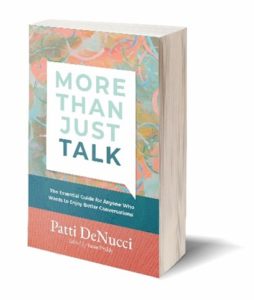“I want to be better at conversations and networking…but I really hate people.”
That’s what one young woman said during the Q&A and final discussion time at the end of my presentation at a leadership conference a few years ago. At first, I thought she was kidding. Then I realized she was totally serious. I suddenly felt great compassion for this person ─ and also thanked her for her honesty and courage in sharing her true feelings in front of the group.
How in the world had she gotten to this place? And was it really true ─ that she hated people? As in, everyone? Was “hate” really the word she meant? What was going on?

It was an interesting and memorable moment that made me think of how many people ─ and not just sulky teens or the neighborhood hermit ─ go about their days behaving in cranky and unsociable ways. No eye contact. No acknowledgements or greetings. And certainly no friendly engagement or even a hint of small talk. Other people? Hah! They don’t exist. Or…they’re bad. Or they’re strangers and therefore they don’t matter.
What might be behind this? In my new book More Than Just Talk: The Essential Guide for Anyone Who Wants to Enjoy Better Conversations, I explore the many obstacles that can prevent us from connecting easily, well, and often in our everyday lives and at work. Among these obstacles are the ways people are brought up and their early influences and experiences that might negatively impact the development of their social confidence or social intelligence. The latter term, by the way, is our awareness and management of our social behavior and how well we pay attention to, interpret, and act on the social cues of others. If we have high social intelligence, it means we socialize comfortably, well, and graciously.
Our earliest social intelligence lessons begin when we are toddlers. Maybe even earlier. Since social intelligence is learned and can always be expanded, the more positive practice we get as kids and as adults, the better. But what if you had parents who never socialized (let alone graciously) in your presence? What if no one ever served as a good social role model or taught you basic manners such as how to introduce yourself politely to other kids and grownups? How would you know how to do it?
In addition, many children grow up with messages like these: “Hush up.” “No talking in class.” “Don’t talk to strangers.” “People are bad.” “You don’t matter.” Also, many young people may not have opportunities to socialize. Or those opportunities aren’t pleasant or safe. In our era of kids growing up staying indoors and staring at screens, can you see how socialization skills can lag?
In speaking with the young woman who claimed to hate people, it was clear something had gone haywire in her early life. Finding the source, processing it, and fixing it would be way over my abilities and experience. But I did tell her that she could do it, and it would be worth it. I also asked her why she had come to the conference and chosen my session. She replied, “I know it’s important that I fix this.” That in itself was a huge first step. Everyone in the session gave her an enthusiastic round of applause. I then gave her a copy of one of my books as a parting gift.
With that, I encourage you to do whatever you can to encourage and teach your own children (or the people you know, teach, or work with) how to socialize well and confidently. It’s important. And I mean important. Arthur C. Brooks, a Harvard professor, social scientist, best-selling author, Wall Street Journal columnist, and enthusiastic teacher on how to live a better life, notes that “Everyone is looking for an edge.” Maybe it’s for themselves or maybe it’s for their kids. “According to the best possible research” that edge is knowing how to engage and being pleasant and friendly. It’s also the #1 secret to a happier and more fulfilling life.
I have an idea! Why not give the young people in your life – maybe this year’s high school or college graduates or the new hires at your company – copies of my award-winning books, More Than Just Talk and The Intentional Networker. Better yet, get yourself copies and read and discuss them together. You can order copies from any online book retailer and BookPeople in Austin also carries it. I also offer discounts for bulk orders made through my office. For more details, please click here.



People should find a non-work related hobby from collecting to volunteer activities, something they enjoy and invest time in it. The network of people aligned with such activities will deliver enough common ground to produce positive engagements — some level of friendships— to emerge from the hate attitude. It’s well worth a try. By the way, you don’t have to hate others to consider or try this suggestion. Cheers!
So wise! A very thoughtful and productive piece of advice, Chuck! Great to hear from you! Yes, we can all put our frustrations, anger, loneliness, grief, and other negative emotions to much better use – and meet people and heal along the way.
“Hate people” is rather extreme. Having a quiet personality isn’t. I for one grew up constantly being asked why I’m so quiet, haven’t said much, etc. Yet when I’ve had something to say, I’m told it’s worth hearing. Make sure quiet participants have a chance to get a word in, and you might be surprised. Introversion isn’t a problem.
Thanks for this thoughtful comment and perspective, Scott. I agree, her choice of words was harsh and maybe inaccurate. I also agree that chattier people (who aren’t necessarily extroverts) need to take a breath and let quieter voices be heard. I cover this extensively in my new book “More Than Just Talk.” Finally, I’d add that being shy or introverted are not excuses for not engaging or being antisocial. As an ambivert who is exactly half introvert and half extrovert, I know the feeling of being socially drained. Yet I have also been taught that to avoid people and conversations all the time isn’t a good way to grow through life and doesn’t lead to success or happiness.